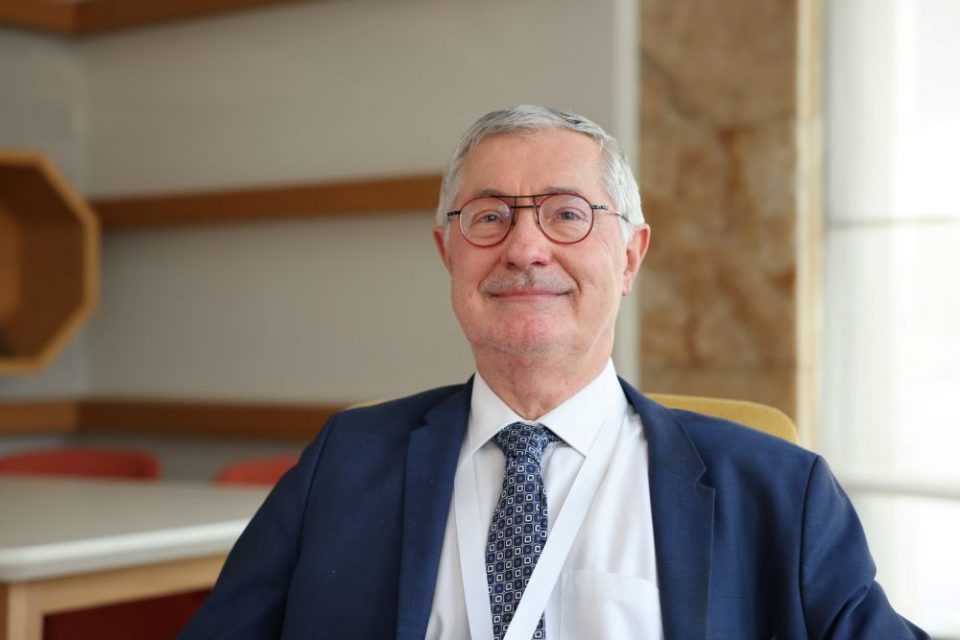Professor Dr. Lionel Rostain, a transplantologist from the University Hospital in Grenoble, a city in France, has been staying in Skopje for the past period between Geneva and Lyon. He took an active part in the Congress of Nephrologists, which was attended by several doctors, and in a conversation for Republika, he pointed out that one of the important things for a country like Macedonia is to resume screening procedures in order to prevent the progress of chronic diseases.
I’m very glad to be in Skopje, attending the 7th Macedonian meeting of the local society of nephrology, dialysis and transplantation. This is my real pleasure to be invited by professor Spasovski and professor Igor Nikolov. By the way, some nephrologists from Macedonia have been trained in France, thanks to good program and one of them was professor Igor Nikolov, he came a few years back in Paris for three years and thereafter he moved to my hospital where he stayed to have some good knowledge in transplant medicine. This is very important, to have some cooperation between Macedonia and France, for the young nephrologists. Indeed, there are very well talented young nephrologists here and they have to be exposed to other teams, from Western Europe. This is the reason why the French embassy wants to help such exchange programs whereby young talented Macedonian nephrologists will come to France for one or two years, to get some deep understanding and deep knowledge in various fields of nephrology. One of the most important things for a country like Macedonia is to prevent the chronic diseases. Why is that? Because the burden and especially the cost of treating patients with chronic diseases is very very high. And indeed, when this condition leads to an end-stage illnessdisease requiring dialysis, it is a huge cost to the society. With that in mind we must, if possible, prevent these chronic diseases. And preventive medicine is based on testing patients for elevated blood pressure, for protenuria, and for renal dysfunction through serum creatinine. These tools, the blood pressure checks, creatinine and protenuria checks are very inexpensive. So, the focus of the Healthcare Ministry should be to conduct these tests in order to detect chronic diseases in time. Why do I say that? Because in 2024 we have very good drugs and very cheap drugs like SGLT2 inhibitors. The cost of these drugs should be covered by the state. Why is that? Because they should be taken for the rest of their lives by patients who are affected by chronic kidney illnesses but are still in the early stages of the disease. The drugs can modify the disease, stabilize the disease for years. The sooner the patients begin to receive these drugs, the SGLT2 inhibitors, the later they will enter the end stage of the disease. Therefore, one of the policies should be to compensate patients for the cost of these drugs in the same way that the cost of anti-neoplastic drugs is compensated, for example. At the end of the day, training young talented nephrologists, for example in France, reimbursing the costs of these new drugs that are very important for patients with kidney diseases, can help to delay the end stage of the disease, with dialysis or transplantation. I have a lot of faith in the nephrologists in Macedonia, they are very well trained, but in the young generation as well said Dr. Lionel Rostain.
Prof. Dr. Igor Nikolov, who gave his lecture at the Congress, emphasized the excellent cooperation with French universities as well as the Embassy of France in Macedonia and expressed great gratitude for the support so far for the development of medicine and scientific thought in Macedonia.

On the Day of Health, April 7, the top professors from France, Prof. Massi and Prof. Rostaing together with the French ambassador Baumgartner discussed the possibility of sending young doctors from Macedonia to France for professional training.
Personally, I think that by sending young doctors for the purpose of education in France and acquiring new knowledge and the most advanced techniques following the example of the most developed European health systems, we will significantly improve our health system.
Then this knowledge will be applied in our health facilities, and with the transfer of knowledge our goal is to include additional teams that will be educated.
We discussed this possibility at the congress with Prof. Rostaing and we jointly concluded that we need to deepen this cooperation with France.
VMRO-DPMNE places high on the priorities in the health program the education in the most modern European and world medical centers and the introduction of new methods in the work, especially if it is taken into account that health as a department has been marginalized in recent years and there is no systematic care for education and training of staff to apply the most advanced methods and techniques. These anomalies will soon be corrected, for which we commit that our top priority will be the personnel policy and training and education of staff in top European medical centers. Then this staff needs to bring the acquired knowledge and apply it in the Macedonian health system – said Prof. Dr. Nikolov.






Comments are closed for this post.